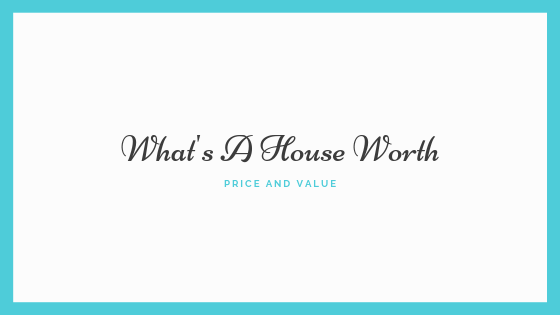When representing a buyer or a seller and helping them to negotiate and decide what a house is worth, I always start with the clients (people first), then the house, then the market. See my posts on how I help sellers and buyers for more on this. For this post, we’ll focus on the part where I research the market and how that influences the price.
More...
What is my House Worth? Price vs Value
First, let’s differentiate between PRICE and VALUE. Price is the money paid for the home, while VALUE is the reason that money was paid. Value is all the benefits that the homeowner receives from owning the home. Value includes benefits like shelter, aesthetic preference, functionality, location, cash flow (for investors), convenience, and more.
Predicting the Future with Past Performance
So, what is a home is worth? The truest answer is somewhat unsatisfactory: It’s worth whatever someone is willing to pay for it (or sell it for).
How do we anticipate what someone is willing to pay? The best way is to look at what other people paid for a similar house. But of course there is always a possibility that someone else would pay more or less for the same house. I say it's ok to peek at computer generated estimates like those on zillow, trulia, and realtor. Just take them with a grain of salt. Their computers don't have common sense and often miss things that are obvious to humans.
Find Out What YOUR house is worth!
Let Us Estimate Your House's Value on Today's Market
A Strange Example, Outliers
Recently in my neighborhood, a developer bought a home for $500,000 when others just like it have been going for at most $300,000. Why? Well that developer had recently purchased three adjacent properties. They have plans and I’m sure that lot was simply worth more to the developer than to the average buyer. That transaction is one in a million and if you hold out for that deal, you’ll be waiting a long time.
Our Process:
Let’s dive into setting the price. I research recent sales of similar homes. Depending on how many transactions there have been I can go back a few months to a few years. I focus on both large market trends and on hyper-local comparables to YOUR home. Remember, I was a math and physics major in college and I’m totally into numbers. Every similar home that was sold, was slightly different. It may have had an extra bathroom, or a garage, or a stinky basement. So I make adjustments to the prices of each home and end up with a set of data like this:

Analysis:
We can eliminate outliers like the one house that sold for $200 in this example. It was so out of the ordinary that it won’t serve as a point of reference. So from there we see that a realistic, price range for this home is from $250 to $315. If the seller is in a rush due to personal circumstances, I’d recommend choosing a price closer to $250. Some sellers are focused on getting as much as possible regardless of time.
You're the boss
I get it. It’s your home and I’m on your side. I won’t negotiate against you. We’ll set the price at what you decide we should ask. We’ll present the home in the best light and work towards the deal you want. In most cases, I’d recommend a middle approach as best because it makes your home visible to a wide-net of potential buyers and may even encourage a bidding war. In this example, assuming the property is reasonably maintained, I’d recommend $285.
Conclusion

Knowing the price that a home should be is like an art, not a science. Buying a house is often more of an emotional decision than it is a rational one. So all these numbers are a way to make an educated guess about what the average buyer would or should pay for the value that this home provides.
Ready to Find Out What YOUR house is worth!
Let Us Estimate Your House's Value on Today's Market

